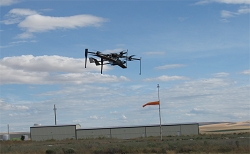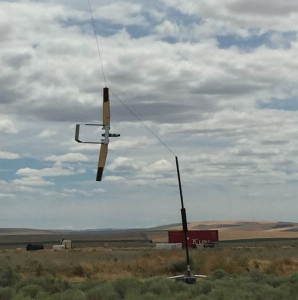FLARES 2.0 Demonstrates Nominal Performance in Wind

Lexington, OR, July 20, 2019 --(PR.com)-- Flight test data indicates that Hood Tech’s Flying Launch and Recovery System (FLARES 2.0) multicopter performs nominally in up to 22 knot wind.
“FLARES achieves robustness by using generously-sized components, and redundancy,” states Hood Tech President, Dr. Andy von Flotow, “UAVs that carry their VTOL-stuff for the entire mission invariably skimp on VTOL component sizing, sacrificing redundancy, power margin and high/hot capability.”
Hood Tech’s next-generation Mast-based Aircraft Retrieval System (MARS 2) also performed nominally in the windy conditions. Following rope impact, the FLARES multicopter lowers the fixed-wing aircraft onto the monopole structure, which protects fragile control surfaces and payloads from ground contact.
In February 2019, FLARES was upgraded to FLARES 2.0. To date, FLARES 2.0 configuration has a perfect record through 60 flights.
FLARES 2.0 is now ready to provide VTOL to any fixed-wing aircraft up to 100 pounds in surface wind to 22 knots.
The photo shows FLARES 2.0 Multicopter carrying an 85 pound aircraft above the taxiway at Lexington Airfield 9S9 in 12-22 knots.
A video of the test at Lexington can be seen at this link.
“FLARES achieves robustness by using generously-sized components, and redundancy,” states Hood Tech President, Dr. Andy von Flotow, “UAVs that carry their VTOL-stuff for the entire mission invariably skimp on VTOL component sizing, sacrificing redundancy, power margin and high/hot capability.”
Hood Tech’s next-generation Mast-based Aircraft Retrieval System (MARS 2) also performed nominally in the windy conditions. Following rope impact, the FLARES multicopter lowers the fixed-wing aircraft onto the monopole structure, which protects fragile control surfaces and payloads from ground contact.
In February 2019, FLARES was upgraded to FLARES 2.0. To date, FLARES 2.0 configuration has a perfect record through 60 flights.
FLARES 2.0 is now ready to provide VTOL to any fixed-wing aircraft up to 100 pounds in surface wind to 22 knots.
The photo shows FLARES 2.0 Multicopter carrying an 85 pound aircraft above the taxiway at Lexington Airfield 9S9 in 12-22 knots.
A video of the test at Lexington can be seen at this link.
Contact
Hood Tech Corp., Vision Inc.
Cory Roeseler
541-387-2255
hoodtechvision.com
Cory Roeseler
541-387-2255
hoodtechvision.com
Multimedia

Lowering 85 pound aircraft to MARS 2.0
A photo of Hood Tech's next-generation Mast-based Aircraft Retrieval System (MARS 2) in windy conditions. Following rope impact, the FLARES multicopter lowers the fixed-wing aircraft onto the monopole structure, which protects fragile control surfaces and payloads from ground contact.
Categories
